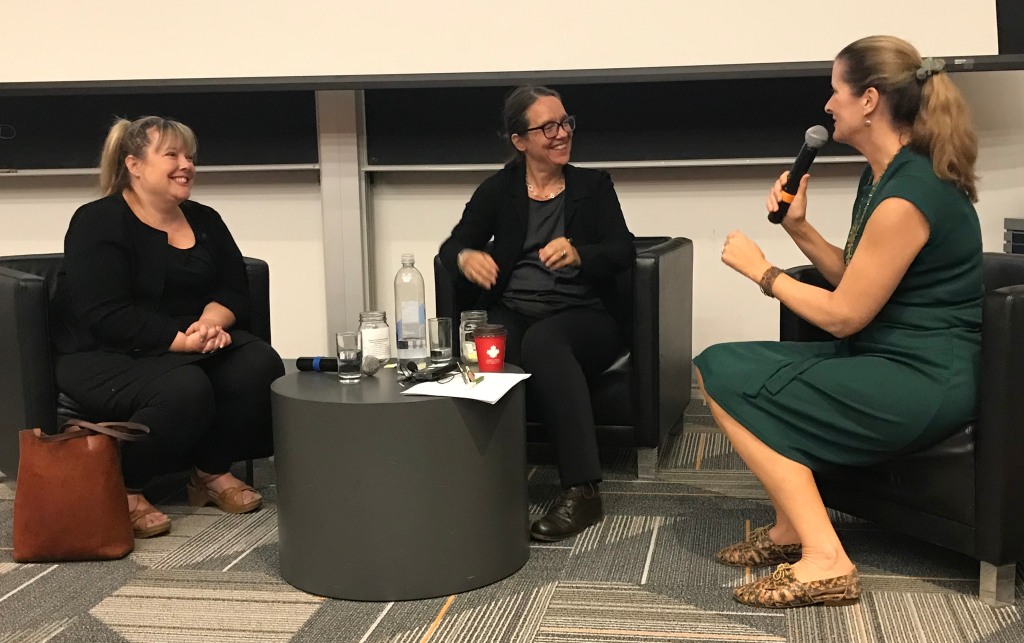by B.A. Tanner

Editors Toronto and Canadian Authors – Toronto (CA-T) were thrilled to co-present their first event of the fall season, in partnership with the Creative Writing Program at the School of Continuing Studies at the University of Toronto, on Tuesday, September 24.
The evening brought together award-winning, medium-crossing writers Zoe Whittall and Wiebke von Carolsfeld. Zoe has published four novels and three poetry collections to date and written for TV shows such as Degrassi and Schitt’s Creek. Wiebke started as a film director, editor, and writer with her directorial debut, Toronto International Film Festival winner Marion Bridge. She launched her first novel, Claremont (Linda Leith Publishing), earlier this year.
CA-T co-president Lee Parpart moderated the discussion and Q&A session. She guided an enlightening conversation focused on writing for both screen and page, and the differences between the two processes. Lee warmed up the audience for the featured discussion by showing video clips from Zoe and Wiebke’s film and TV work. Wiebke shared a trailer for The Saver, a drama she wrote and directed about an orphaned teenager with a desire to build a new life using a self-help book she found at her cleaning job. The tone switched gears when Zoe contributed a short skit called “Buffin’ Your Muffin” that aired on Baroness von Sketch Show and captured oodles of laughs from the audience.
Wiebke launched the evening’s readings with an intense opening scene from Claremont. From the point of view of nine-year-old Tom witnessing the murder-suicide of his mother and father, the novel explores a family coping and rebuilding after experiencing a horrible trauma. Zoe, in turn, read from her novel The Best Kind of People (House of Anansi Press), a finalist for the 2016 Scotiabank Giller Prize. The prologue she read included a gripping scene where a man becomes a hero during a school shooting but later falls from grace.
When Lee asked about the pleasures and frustrations of writing for two mediums, Wiebke explained that she actually started to write Claremont for film, but when the producer attached to the project retired, she decided to turn it into a novel. Doing so enabled her to use changing points of view, a technique that is difficult to do in film. In fact, she appreciated the ability to switch between points of view so much that her first draft had nine or 10 points of view, which she eventually had to limit to four. Wiebke was struck also by the fact that when beginning a novel “you can just write it”; whereas screenplays require more collaboration and planning.
Zoe had the opposite journey, from books to screen, and found it hard to transition from years of mainly writing on her own at home to working with others in writing rooms all day. She expressed that every writing room is a little bit different, with its own rules and hierarchy, and writing one episode generally takes two to five consecutive weeks. Zoe noted a major difference between writing novels and writing TV scripts: that TV writers have to think of new storylines quickly and must be able to hastily discard ideas, even those they are attached to.
A highlight of the evening was an eye-opening conversation about the difficulty of being a woman or person of colour in both the filmmaking and writing industries. The panellists agreed there is a lot less funding for women and people of colour and more resistance to their projects. When the discussion was opened up for questions from the audience, the speakers were asked how much detail should be used when describing an act of violence against a woman or child. Zoe and Wiebke agreed they typically avoid being overly graphic with those scenes, but that every story is different and some narratives call for more explicit descriptions.
Similarly striking, Zoe’s accounts of publishers against including LGBTQ+ characters in her stories exposed the problematic lack of representation in mainstream fiction. Zoe confided that publishers have asked her to remove or limit the number of LGBTQ+ characters in her stories. She has found that having LGBTQ+ characters in her manuscript means she has to work much harder to find an interested publisher.
The evening concluded with some fan favourites. The raffle draw saw many of the attendees winning book prizes before gathering to buy the panellists’ books and have them signed by Zoe and Wiebke. The crowd headed back out into the autumn air with new fiction to read and a greater understanding of authors and filmmakers.
B.A. Tanner is a Toronto-based writer and photographer. She is the membership coordinator for Canadian Authors – Toronto.
This article was copy edited by Ambrose Li.
